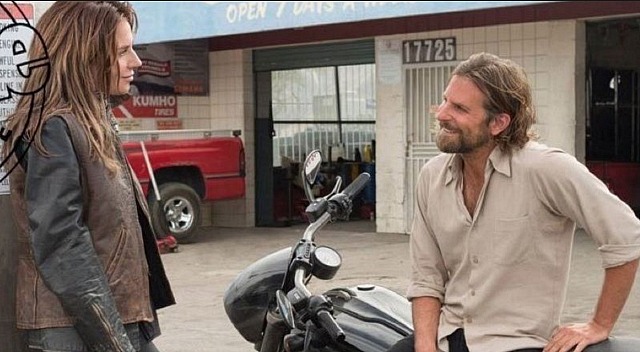Last night I leafed through a 10.27.16 draft of A Star Is Born, written by Will Fetters and director-star Bradley Cooper. I’ll read it cover-to-cover soon, but it struck me as reasonably well written, at times even eloquent. Especially at the very end. And remember the script has since been tweaked by Eric Roth, Irene Mecchi, Stephen J. Rivele and Christopher Wilkinson.
If the celebrity buzz has any validity, Cooper will get a big bump as a respected director and Lady Gaga…sorry, Stefani Germanotta will probably be the one to attract laurels for performing. Maybe. What do I know?
One small observation: Gaga/Germanotta has always been a voice first and a flamboyantly glammy presence (heavily made-up, crazy wigs, over-the-top Vegas-y wardrobes) second. For years I could never picture in my head what she actually looked like without all the glammy trimmings.
But recent on-set photos have shown that without all that stuff Germanotta is…what’s the polite way to say this?…a rather plain-featured woman. Not exactly someone who would inspire a “hey, who’s that?” if you saw her on the street. She could be the stressed-out owner of a small osteria in Southern Italy or the owner of a Milan art gallery. Not “unattractive’ but who would call her a knockout or, say, an erotic presence a la Anna Magnani?
Of course if the movie camera falls for her and she can really act then all bets are off, and that may happen…

Taking a broader view…
In the 1937 and George Cukor-directed 1954 versions of A Star Is Born, the movie-star drunk’s name was Norman Maine, and the lead female character (played by Janet Gaynor and Judy Garland) was called Esther Blodgett.
In Frank Pierson‘s 1976 version (which also bore the heavy imprimatur of star-exec producer Barbara Streisand and producer Jon Peters), Kris Kristofferson‘s musician drunk was named John Norman Howard. Streisand’s protagonist was naturally renamed Esther Hoffman rather than Blodgett, which is an English-Welsh name.
In Cooper and Fetters’ script the drunk is named Jackson (“Jack”) Maine. Lady Gaga’s character is called Alli Campana. (The last name obviously from the Italian term “campagna” — friend, companion.) The script spells her first name as “Alli” — Wikipedia spells it “Ally.”
Cooper’s Star Is Born is rooted in the country-music realm, and yet in the script I read Mr. Maine ends up in the same Pacific ocean, off the same Malibu coast with the same “I can’t take it any more,” the same “she’ll be better off without me.”
I’ve never been moved by any of the Star Is Born films, going back to the 1937 William Wellman version. With all due compassion my reaction has always been (a) “drunks are a drag…do I really have to hang with this tedious fellow?” and (b) “Do us all a favor and commit suicide already…get it over with.”
I’m not talking about a lack of compassion for people with actual addictions, but an inability to tolerate characters who drive audiences to lethargy and despair with their predictability and repetition, the same inability to get past their Big Damn Problem. Excerpt from Frank Pierson‘s 11.15.76 New West article, “My Battles With Barbra and Jon”: “Kris’s character often seems an unpleasant drunken dangerous bore [while Barbara’s character] seems silly — why would she love him?”
Speaking as the son of a reformed alcoholic and one who had a vodka problem in the early ’90s before turning the corner, I can’t shed a tear for a drunk or a coke-head who can’t stand up and embrace sobriety. Life is choices. Sorry if you can’t overcome your addiction, but dramatically speaking addicts are very dull. If you ask me they can all take a swim in the Pacific.
Again from Pierson’s New West piece:
“An actress is a little more than a woman, an actor a little less than a man (Oscar Wilde) … The woman in our story is ambitious to become a star, but it is not necessary: it can make her happier and richer, but she could give it all away and not be a better or worse person. With stardom she is only a little more than a woman.
“For the man, his career is his defense against a self-destructive part of himself that has led him into outrageous bursts of drunkenness, drugs, love affairs, fights and adventures that have made him a legend. His career is also what gives him his sense of who he is. Without it, he is lost and confused; his demons eat him alive. That’s why he is a little less than a man.
“And it is not that her success galls him, or that she wins over him; the tragedy is that all her love is not enough to keep alive a man who has lost what he measures his manhood with — his career.
“And so the conclusion is measured by the theme. He takes his life in the mistaken belief that he will then not drag her down with him.”



